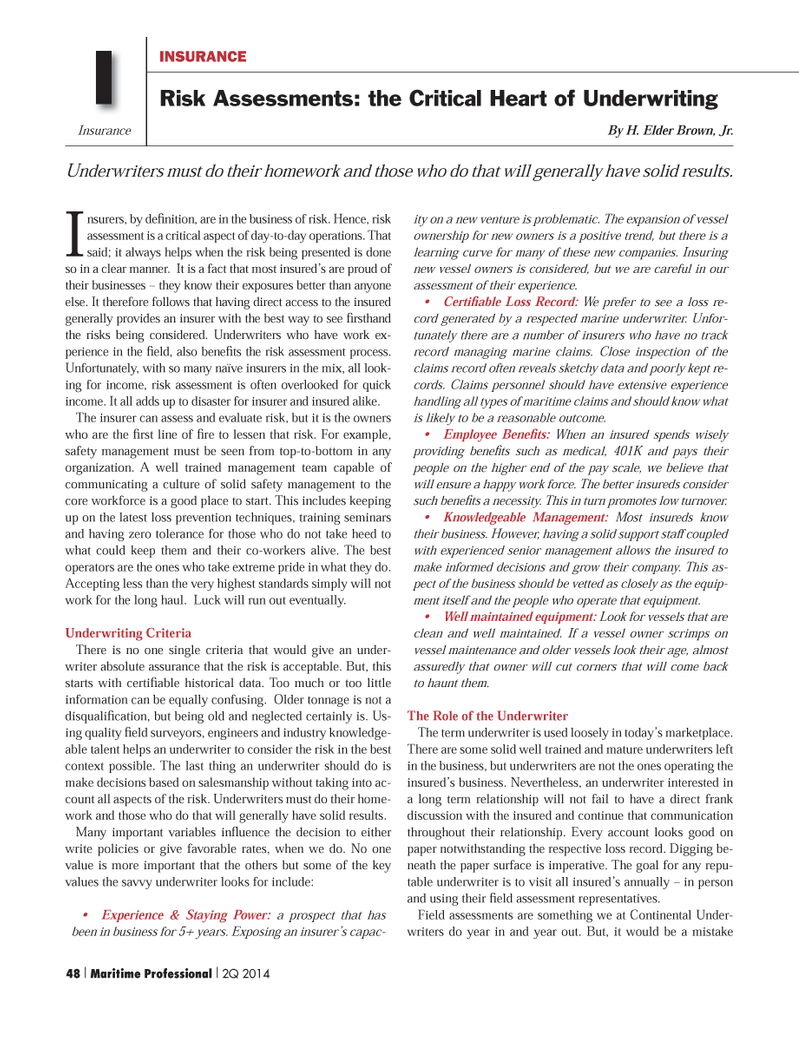
Page 48: of Maritime Logistics Professional Magazine (Q2 2014)
Maritime Risk & Shipping Finance
Read this page in Pdf, Flash or Html5 edition of Q2 2014 Maritime Logistics Professional Magazine
I nsurers, by defi nition, are in the business of risk. Hence, risk assessment is a critical aspect of day-to-day operations. That said; it always helps when the risk being presented is done so in a clear manner. It is a fact that most insured’s are proud of their businesses – they know their exposures better than anyone else. It therefore follows that having direct access to the insured generally provides an insurer with the best way to see fi rsthand the risks being considered. Underwriters who have work ex- perience in the fi eld, also benefi ts the risk assessment process.
Unfortunately, with so many naïve insurers in the mix, all look- ing for income, risk assessment is often overlooked for quick income. It all adds up to disaster for insurer and insured alike.
The insurer can assess and evaluate risk, but it is the owners who are the fi rst line of fi re to lessen that risk. For example, safety management must be seen from top-to-bottom in any organization. A well trained management team capable of communicating a culture of solid safety management to the core workforce is a good place to start. This includes keeping up on the latest loss prevention techniques, training seminars and having zero tolerance for those who do not take heed to what could keep them and their co-workers alive. The best operators are the ones who take extreme pride in what they do.
Accepting less than the very highest standards simply will not work for the long haul. Luck will run out eventually.
Underwriting Criteria
There is no one single criteria that would give an under- writer absolute assurance that the risk is acceptable. But, this starts with certifi able historical data. Too much or too little information can be equally confusing. Older tonnage is not a disqualifi cation, but being old and neglected certainly is. Us- ing quality fi eld surveyors, engineers and industry knowledge- able talent helps an underwriter to consider the risk in the best context possible. The last thing an underwriter should do is make decisions based on salesmanship without taking into ac- count all aspects of the risk. Underwriters must do their home- work and those who do that will generally have solid results.
Many important variables infl uence the decision to either write policies or give favorable rates, when we do. No one value is more important that the others but some of the key values the savvy underwriter looks for include: Experience & Staying Power: a prospect that has been in business for 5+ years. Exposing an insurer’s capac- ity on a new venture is problematic. The expansion of vessel ownership for new owners is a positive trend, but there is a learning curve for many of these new companies. Insuring new vessel owners is considered, but we are careful in our assessment of their experience. Certifi able Loss Record: We prefer to see a loss re- cord generated by a respected marine underwriter. Unfor- tunately there are a number of insurers who have no track record managing marine claims. Close inspection of the claims record often reveals sketchy data and poorly kept re- cords. Claims personnel should have extensive experience handling all types of maritime claims and should know what is likely to be a reasonable outcome. Employee Benefi ts: When an insured spends wisely providing benefi ts such as medical, 401K and pays their people on the higher end of the pay scale, we believe that will ensure a happy work force. The better insureds consider such benefi ts a necessity. This in turn promotes low turnover. Knowledgeable Management: Most insureds know their business. However, having a solid support staff coupled with experienced senior management allows the insured to make informed decisions and grow their company. This as- pect of the business should be vetted as closely as the equip- ment itself and the people who operate that equipment. Well maintained equipment: Look for vessels that are clean and well maintained. If a vessel owner scrimps on vessel maintenance and older vessels look their age, almost assuredly that owner will cut corners that will come back to haunt them.
The Role of the Underwriter
The term underwriter is used loosely in today’s marketplace.
There are some solid well trained and mature underwriters left in the business, but underwriters are not the ones operating the insured’s business. Nevertheless, an underwriter interested in a long term relationship will not fail to have a direct frank discussion with the insured and continue that communication throughout their relationship. Every account looks good on paper notwithstanding the respective loss record. Digging be- neath the paper surface is imperative. The goal for any repu- table underwriter is to visit all insured’s annually – in person and using their fi eld assessment representatives.
Field assessments are something we at Continental Under- writers do year in and year out. But, it would be a mistake
Insurance
INSURANCE
Risk Assessments: the Critical Heart of Underwriting
I
By H. Elder Brown, Jr.
Underwriters must do their homework and those who do that will generally have solid results. 48 I Maritime Professional I 2Q 2014 34-49 Q2 MP2014.indd 48 5/16/2014 2:57:56 PM

 47
47

 49
49
